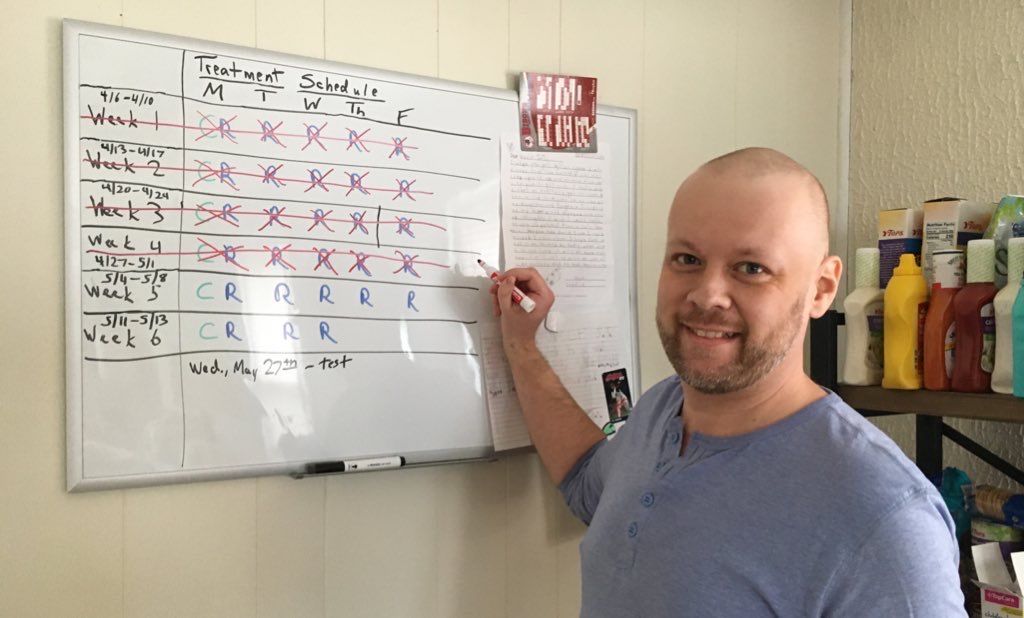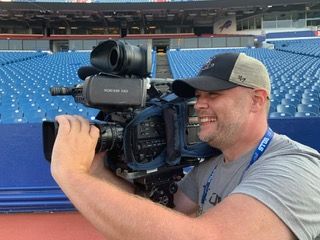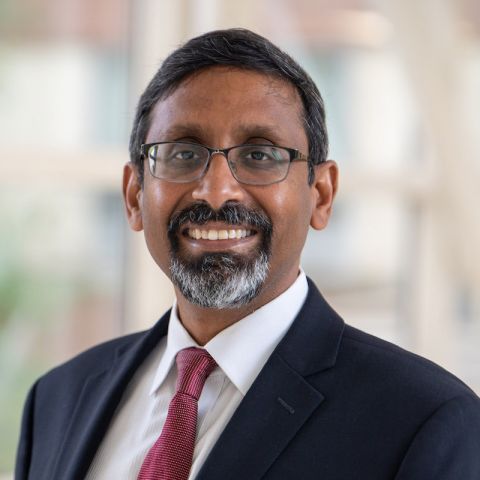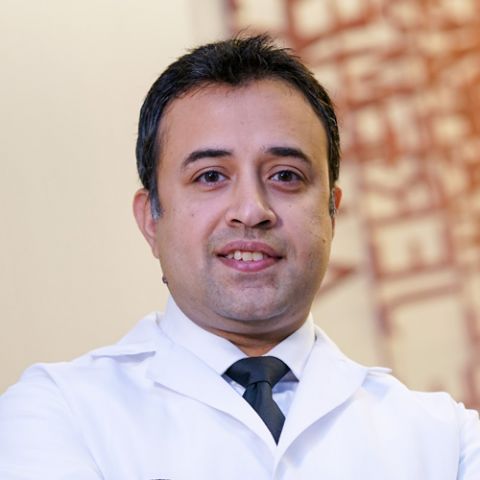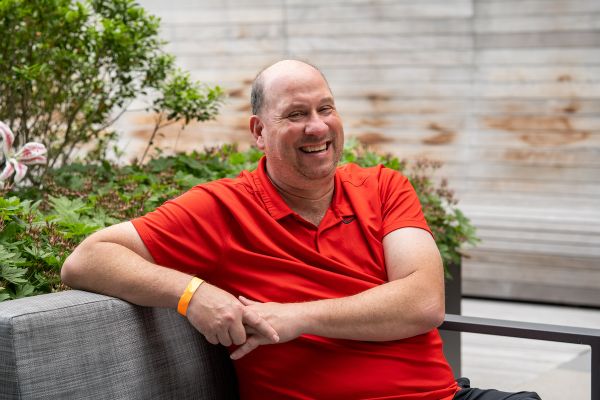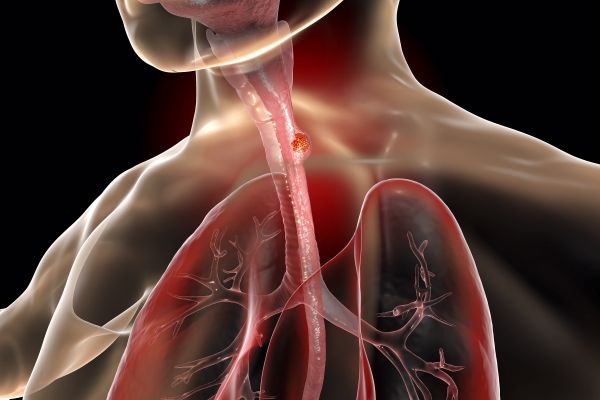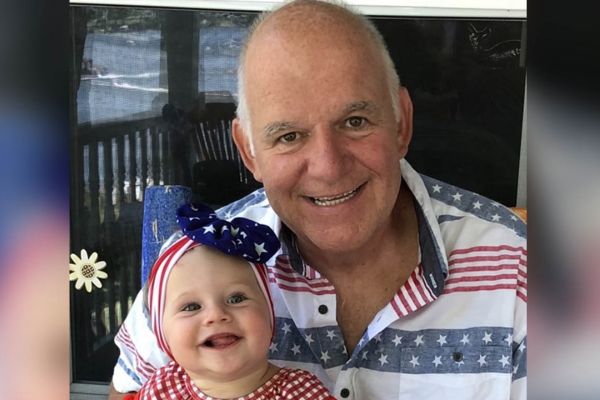As a sports and news photojournalist for a Buffalo television station, J.T. Messinger is used to seeing the world through a camera lens. But in 2020, he unexpectedly learned to view the world through the new lens of a patient with esophageal cancer in the midst of a pandemic.
Thanks to state-of-the-art treatment at Roswell Park Comprehensive Cancer Center, the support of his family and friends, and an analytical and positive attitude about his situation, these days J.T. views the world through another new lens — that of a cancer survivor.
Classic symptoms of esophageal cancer began to appear
At age 39, J.T. met very few of the common risk factors for esophageal cancer. He was well under age 65, didn’t smoke, wasn’t a heavy alcohol user, and wasn’t overweight. In fact, he was quite active and played hockey throughout his life, including two years as a team member in The 11 Day Power Play. Cancer was the last thing he suspected when his “innocuous” symptoms started in late 2019.
“First, I got hiccups every time I ate. Next, I began vomiting small amounts of undigested food,” J.T. recalls. Then he experienced one of the most common symptoms of esophageal cancer: difficulty in swallowing his food. “In February 2020, when I vomited into my hands, I knew something was wrong. My primary care doctor recommended an upper endoscopy of my esophagus. I didn’t know they would also biopsy tissue samples from the procedure, so it was a surprise when I got a call the next day saying the biopsy had shown cancerous cells and my doctor had already called Roswell Park to arrange an appointment for me.”
Two days later, J.T. and his parents met with Roswell Park thoracic surgeon Sai Yendamuri, MD, who specializes in minimally invasive surgery and treatment for both esophageal and lung cancers. “It was just me in his office at first, and when Dr. Yendamuri told me that I had stage 3 esophageal cancer, I was in disbelief,” J.T. says.
“Then my parents came in to ask questions. When my mom heard the diagnosis, her first question was, ‘Are you sure?’” Dr. Yendamuri was indeed sure, as he had reviewed J.T.’s symptoms, imaging and biopsy results with a tumor board of esophageal cancer experts at Roswell Park. Together, the team of pathologists and surgical, medical and radiation oncologists agreed on the diagnosis and came up with treatment options.
Dr. Yendamuri noted that J.T. would be an excellent candidate for a promising clinical trial, using a new combination of drugs to shrink and possibly eliminate tumors before surgery.
J.T.’s treatment plan would involve daily radiation, under the guidance of Nadia Malik, MD, Director of Thoracic Radiation Services, combined with weekly chemotherapy for a total of six weeks. After that, provided J.T. was healthy enough, Dr. Yendamuri and surgical oncologist Moshim Kukar, MD – who serves on the National Comprehensive Cancer Network (NCCN) panel that creates the treatment guidelines for esophageal and esophagogastric cancer used around the world – would work together to perform a minimally invasive Ivor Lewis esophagectomy. The procedure removes the diseased portion of the esophagus, and any potentially affected lymph nodes, and repositions the stomach higher in the chest to connect to the remaining part of the esophagus.
Why Roswell Park for esophageal cancer?
We offer treatments at the forefront of cancer care, plus a multidisciplinary care team with the knowledge and experience to use them.
Coping with fear and uncertainty during COVID shutdown
Just as J.T, was about to begin treatment in March 2020, the COVID pandemic changed everything. “It was a scary time. I remember NBA games being cancelled right before tip-off due to infected players, and then the season being suspended. Schools and workplaces closed. Protocols and safeguards changed daily. There were strict limitations on who could accompany patients to appointments or visit. Then, my treatment was moved up, while the staff at Roswell Park figured out how to best navigate the COVID situation while still treating patients and keeping everyone safe,” J.T. says.
“The whole situation was a lot to take in,” J.T. admits. “But I’m a person who likes to research things to try and face my fears and get some sense of control.” After hearing his diagnosis, J.T. did what many people do; he googled “survival rates for stage 3 esophageal cancer” and found bleak results. “My advice is not to go too deep down that Google rabbit hole. Everyone’s treatment and cancer journey will be different, depending on what treatment they receive and where, their age, overall health, and many other factors. Even during this terrifying time, everyone at Roswell Park was professional and had a positive mindset, and I decided to follow their lead, trust their recommendations, and try to focus my energy on getting better.”
To monitor his progress, J.T. made a checklist on a whiteboard, noting all his treatment dates and tests. With a blend of realism and humor, he also began posting about his situation on social media.
“4/6 Week 1 - Day 1: If anyone has been wondering where I’ve been, at the end of February I was diagnosed with esophageal cancer. A week later, COVID-19 shut everything down. As I’m now immunocompromised I’ve been at home since, short of my Roswell trips. Today was my 1st day of treatment. Treatment lasts five and a half weeks, after which if everything goes well we operate with a goal to cure. The bad news: I was given a steroid today so my Olympic dream has come to an end. #doping"
“4/20 Week 3, Day 1: Into the dog days of treatments. #BaseballReference The sun: out Quarantine hair: long Energy: low Fear of needles: pretty much obliterated at this point”
“5/13/20 The board is full. All done. And I don’t have to get poked with anything for like two weeks. I can’t say enough about Dr. Malik and the amazing doctors in the Roswell radiation department. I saw the same faces every day and they gracefully pulled me through this, each one.”
A successful surgery and outcome
In late July, J.T was ready for his esophagectomy. “In this minimally invasive robot-assisted surgery, Dr. Kukar made several small incisions in my abdomen and removed 4 centimeters of my esophagus at the juncture of my stomach, along with one-third of my stomach and 18 lymph nodes. Then Dr. Yendamuri opened up my back and surgically reattached the remaining two-thirds of my stomach to my esophagus. When I woke up, I had a feeding tube.
“Fortunately, all of the nurses, nutritionists and support staff were amazing during my stay in the hospital, and I was able to have a couple friends visit me. Unfortunately, my mom wasn’t able to visit because she’d been with my father for his medical procedure in Ohio, just as a mandatory quarantine was placed on anyone traveling from Ohio to New York. My mom was finally able to see me on the day I was released from Roswell Park, five days after my surgery,” J.T. recalls.
“I was blessed to have my parents temporarily move in with me and help me during my recovery. Roswell Park’s dietitians provided us with detailed instructions about what types of foods and liquids I could consume, how to prepare the foods, the required number of daily calories, and so on. Even so, I lost 60 pounds during over the next few months.” But, a week after surgery, J.T. reported great news:
“8/6/20 Today I had my first post-op check-up/surgery results at Roswell. To summarize: successfully removed the tumor in my esophagus, all margins are uninvolved — removed adjoining stomach tissue, tested negative — removed 18 lymph nodes, all tested negative”
By the end of August, J.T. was cleared to return to work, just in time to cover the last Buffalo Bills preseason game.
Support services for patients
In addition to nutritionists, our wide range of support services aims to help you and your family through this overwhelming time.
The next chapter
Three years after his initial diagnosis, J.T. is still NED (no evidence of disease) and goes to Roswell Park every six months for check-ups. He has regained 30 of the pounds he lost after surgery. In 2021 and 2022, he was again able to skate in The 11 Day Power Play. Collectively, his Crusaders team has raised more than $100,000 for cancer research and treatment in Western New York.
Of his participation in this event and as a survivor, J.T. says, “Fighting cancer has become personal to me, I know there are so many others out there who need life-saving help, and I am so grateful that I was able get that life-saving help at Roswell Park.”
Editor’s Note: Cancer patient outcomes and experiences may vary, even for those with the same type of cancer. An individual patient’s story should not be used as a prediction of how another patient will respond to treatment. Roswell Park is transparent about the survival rates of our patients as compared to national standards, and provides this information, when available, within the cancer type sections of this website.
